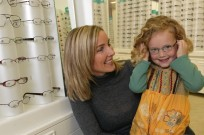Frequently Asked Questions
This page provides the answers to some of the questions that eyecare practitioners are most often asked.
Q: Is it true that wearing glasses all the time will make my eyes lazy and I will become dependent on them?
A: No. When people wear the proper glasses they realise they can see more clearly and comfortably. What they may have considered normal and acceptable before is now inferior by comparison.
Q: Is an optometrist the same as an optician?
A: The term 'optometrist' came into use in 1987 to replace 'ophthalmic optician' in the same way that 'pharmacist' replaced 'chemist'. An optician can be ophthalmic, dispensing or manufacturing; it is the optometrist who is qualified to test your eyes. Some dispensing opticians have extra qualifications that enable them to fit contact lenses and carry out certain clinical tests.
Q: I'm diabetic. Does that make a difference?
A: Yes. Diabetes can cause severe problems with your sight. It is very important that your eyes are checked every year, preferably with drops to dilate the pupil, so that the retina (back of the eye) can be examined thoroughly.
Q: How old does a child have to be before he or she can have an eye examination?
A: Any age really. A child's eyes have finished developing by the time they are about eight years old. Many health authorities screen children in their area at around three years of age, but if you are concerned, or if there are any members of your family with eye problems, then it's best to have your child's eyes tested.
Q: Are paper tissues alright for cleaning my glasses with?
A: If you have plastic lenses in your glasses then dry tissues will scratch them. It is generally better to dampen the tissue, or even use soapy water and a soft cloth. Glasses with anti-glare coatings should be cleaned with a special cloth and spray.
Q: How long should a sight test take?
A: It depends on who the patient is. A young, healthy person with no apparent problems will take about 20 minutes. Someone older, perhaps with high blood pressure, diabetes, glaucoma or other ailments can take much longer. The optometrist will determine what clinical tests are needed to provide the correct information for new glasses or contact lenses. If necessary, they may refer the patient for a medical opinion. At Openshaw opticians we book 30 minute appointments for all patients.
Q: I think I have good sight, but I would like to have glasses as a fashion accessory. Would an optician be prepared to give me glasses that don't change my vision?
A: If you've had your eyes checked and they are as good as you think, then Openshaw opticians will have no objection to you having plain or tinted lenses in a frame of your choice, or contact lenses that can enhance or change the colour of your eyes.
Q: If there is a history of glaucoma in my family, am I likely to inherit it?
A: If there is glaucoma in the family, you may be more at risk of developing it. Glaucoma can be treated effectively if it is diagnosed in time, so be sure to have a regular eye examination.
Q: Can I sleep in my contact lenses?
A: No, unless specifically told that you can by your eyecare practitioner. Sleeping in your lenses can be hazardous as it can lead to infection or damage to the cornea (front window of the eye).
Q: Does it matter what contact lens solution I use?
A: It is important that you follow the advice of your practitioner. Not every solution will suit every patient, for the lenses they are wearing. If you do change your cleaning system for any reason, always inform your practitioner.
Q: I've been told that I can't wear contact lenses because I have astigmatism. Is this true?
A: There are many kinds of contact lenses available now which will correct astigmatism, both in soft and gas permeable materials. Your practitioner may be able to fit you or may recommend a colleague if it is a specialist fitting.
Q: I've heard that contact lenses can slip round to the back of my eye.Is this true?
A: No. There is a thin, transparent membrane which covers the inside of the eyelids and the outside of the eye. This forms a seal which prevents contact lenses - as well as grit, dust and other 'foreign' material - passing round to the back of the eye. It has been known for contact lenses to 'hide' beneath eyelids, but this is easily rectified.
Information C/o
The Eyecare Trust is a registered charity that exists to promote awareness of all aspects of eye health. For more information call our public information line on 0845 129 5001 or log on to www.eyecaretrust.org.uk



